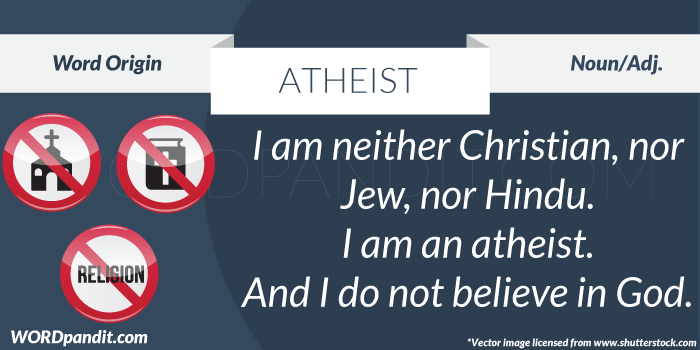Detailed Article for the Word “Atheist”
What is Atheist: Introduction
Imagine gazing at a night sky filled with stars, yet seeing only the vast emptiness between them. An atheist approaches questions of existence with a similar focus, grounding their beliefs in observable reality rather than religious or spiritual faith. In a world that values diversity of thought and personal freedom, atheism offers a framework for those who find meaning and morality without invoking a divine presence. As discussions around belief, science, and ethics evolve, the term “atheist” has taken on new resonance, reflecting a growing number of people who embrace a secular worldview.
Origin and History of the Word Atheist
The word “atheist” originates from the Greek “atheos,” meaning “without god(s)” or “godless,” derived from “a” (without) and “theos” (god). It first appeared in English in the mid-16th century, primarily as a term of disapproval, used to describe individuals perceived as denying accepted religious beliefs. During the Enlightenment, as scientific inquiry and humanist philosophy rose in prominence, “atheist” began to shift from a pejorative to a self-identified stance among thinkers who prioritized reason over religious doctrine. By the 20th century, atheism became widely recognized, especially in philosophical, scientific, and ethical discussions, as a legitimate worldview that continues to evolve in response to cultural and intellectual shifts.
Meaning and Definition of Atheist
Atheist (noun):
- A person who does not believe in the existence of any gods or divine beings
- Someone who identifies with a secular or non-religious worldview, often grounded in science and logic
- A person who rejects religious belief or denies the existence of any deity
Usage note: “Atheist” specifically refers to disbelief in gods, but may also imply a broader skepticism toward supernatural concepts.
How to Pronounce Atheist
AY-thee-ist
How to Remember Atheist: Memory Tips
To remember “atheist,” think of “a-” (without) + “theist” (believer in a god). Another mnemonic is to picture the phrase “a-theist” as “against theism” to remind you that an atheist does not subscribe to belief in deities. You might also recall “A” (absent) and “theist” (one who believes in god), a simple way to connect the word to its meaning.
Atheist in a Sentence: Examples and Usage
- Philosophical: As an atheist, she found purpose through ethical principles rather than religious doctrine.
- Historical: Enlightenment philosophers often identified as atheists, advocating reason over religious belief.
- Literary: The character in the novel was a self-proclaimed atheist, relying on science to make sense of the world.
- Social: He faced challenges in his community for being openly atheist in a predominantly religious region.
- Academic: The scholar studied the cultural impact of atheism across various societies.
- Political: Some governments support freedom of belief, allowing both religious and atheist perspectives to flourish.
- Personal: Although raised religious, she chose to identify as an atheist in her adulthood.
Difficulty Level of Using Atheist
Basic to Intermediate: While the term is widely understood, it can carry varying connotations. Using it accurately involves understanding the distinction between disbelief in gods and broader non-religious identities.
Modern Usage of Atheist in Contemporary Context
In today’s increasingly pluralistic society, the term “atheist” encompasses a spectrum of secular perspectives. It often appears in discussions on science, philosophy, and ethics, where individuals may identify as atheist due to a preference for empiricism and rational inquiry. Social movements, such as secular humanism and ethical non-theism, have emerged in parallel, seeking to advocate for moral values independent of religious influence. In the political sphere, atheists often advocate for the separation of church and state, ensuring that policies remain secular to support diverse beliefs. Digital communities and secular organizations provide spaces for atheists to share ideas and discuss topics like morality, purpose, and community in a non-religious framework. As society becomes more accepting of varied belief systems, the conversation around atheism highlights the evolving nature of personal belief and freedom in a multicultural world.









nice